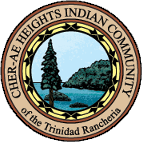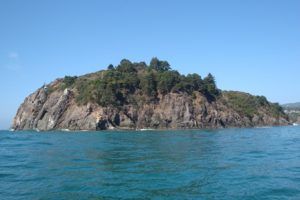
Trinidad Rancheria Environmental Program
Trinidad Rancheria Environmental Program (TREP) was founded in 1996 to protect the air, land, water, wildlife, and cultural resources of the Trinidad Rancheria for present and future generations.
TREP assists in the development of environmental programs, planning, and policy for Trinidad Rancheria:
Water Quality Protection
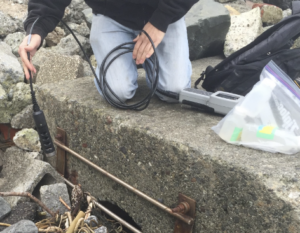 In 2002,Trinidad Rancheria established a Tribal Water Quality Monitoring Program that has allowed the Tribe to collect and evaluate over two decades of data. All data collected from the water monitoring program is publicly accessible online through the Water Quality Portal.
In 2002,Trinidad Rancheria established a Tribal Water Quality Monitoring Program that has allowed the Tribe to collect and evaluate over two decades of data. All data collected from the water monitoring program is publicly accessible online through the Water Quality Portal.
Trinidad Rancheria is dedicated to working with the community to improve and maintain the watersheds and coastal waters in the region for the benefit of all community members, and actively participates in the Trinidad Bay Watershed Council.
Nonpoint Source (NPS) Pollution Control
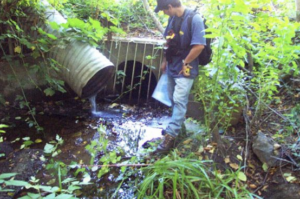 Non-point source pollution (NPS) poses a significant threat to Trinidad Rancheria’s water resources. NPS pollution can be challenging to control because it is a combination of pollutants from a large area rather than from a single identifiable source such as a drainage pipe.
Non-point source pollution (NPS) poses a significant threat to Trinidad Rancheria’s water resources. NPS pollution can be challenging to control because it is a combination of pollutants from a large area rather than from a single identifiable source such as a drainage pipe.
In 2009, TREP developed a Nonpoint Source Assessment and Management Plan to manage sources of NPS pollution on tribal land. The Nonpoint Source Pollution Assessment Report identifies potential sources of NPS pollution and outlines management treatments to reduce NPS impacts. Trinidad Rancheria implements projects and practices to minimize impacts on local water quality based on NPS pollution planning.
Protecting Trinidad Bay
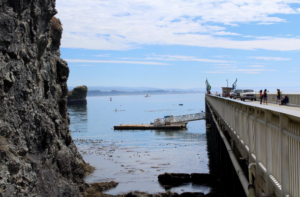 Trinidad Rancheria’s cultural heritage is inherently connected with the vast ocean resources that inhabit Trinidad Bay. In 1974, the giant kelp forests surrounding Trinidad Head were designated as the Trinidad Head Area of Special Biological Significance (ASBS). Trinidad Rancheria is a proud steward of Trinidad Bay and is active in preventing, identifying, and eliminating discharges into the ASBS.
Trinidad Rancheria’s cultural heritage is inherently connected with the vast ocean resources that inhabit Trinidad Bay. In 1974, the giant kelp forests surrounding Trinidad Head were designated as the Trinidad Head Area of Special Biological Significance (ASBS). Trinidad Rancheria is a proud steward of Trinidad Bay and is active in preventing, identifying, and eliminating discharges into the ASBS.
In 2012, Trinidad Rancheria replaced the existing pier, built in 1947, with a new state-of-the-art pier that includes an infiltration system engineered to collect and divert stormwater runoff.
Oil Spill Response
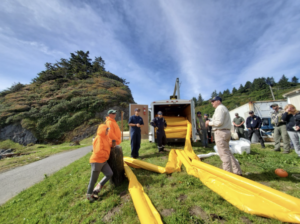 Trinidad Harbor is an important location for the Tribe both economically and ecologically. The viability of the harbor and surrounding waters rely on the safe and proper handling of petroleum in the marine environment. TREP supports the protection of the biological resources of Trinidad Bay by providing assistance to the Tribe with essential equipment, training, and procedures to increase the capacity to respond to marine oil spills.
Trinidad Harbor is an important location for the Tribe both economically and ecologically. The viability of the harbor and surrounding waters rely on the safe and proper handling of petroleum in the marine environment. TREP supports the protection of the biological resources of Trinidad Bay by providing assistance to the Tribe with essential equipment, training, and procedures to increase the capacity to respond to marine oil spills.
Invasive Plant Management
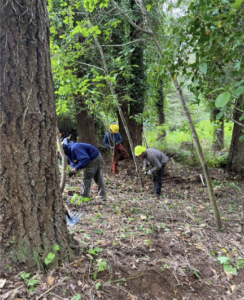 The land surrounding Trinidad Rancheria supports many types of culturally significant native plants. These native plants are threatened by invasive plant species that outcompete and displace native plant communities.
The land surrounding Trinidad Rancheria supports many types of culturally significant native plants. These native plants are threatened by invasive plant species that outcompete and displace native plant communities.
Trinidad Rancheria has initiated an Invasive Weed Management Program to identify, assess impacts, and prescribe treatments for managing invasive plants on tribal land. In 2022 alone, the Rancheria was successful in removing over 8,000 pounds of invasive plant material from local watersheds.
Trinidad Rancheria is dedicated to the control of invasive plants that adversely impact the environment of Humboldt County, and works closely with the California Invasive Plant Council and the Humboldt Weed Management Association.
Solid & Hazardous Waste Reduction
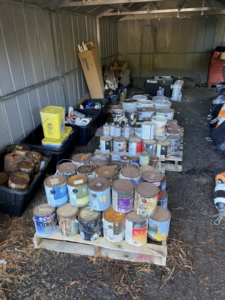 Trinidad Rancheria follows an integrated approach to manage solid waste that promotes resource conservation by incorporating recycling, recovery, reduction, and clean up into tribal waste management.
Trinidad Rancheria follows an integrated approach to manage solid waste that promotes resource conservation by incorporating recycling, recovery, reduction, and clean up into tribal waste management.
TREP assists in the development of integrated waste management strategies that reduce waste from tribal residences, administration, and business enterprises. Activities include: community composting program, tribal recycling program, and zero-waste event planning.
Pollution Prevention
 Pollution prevention planning plays an increasingly significant role in the reduction of greenhouse gas (GHG) emissions and resource conservation. Trinidad Rancheria recognizes its role in making environmentally sustainable choices and supports strategies aimed to control pollution at the source by choosing low toxic or environmentally preferred alternatives. The Tribe takes measures to ensure that solid and hazardous waste is minimized and disposed of in compliance with applicable Federal, State, and Tribal laws to prevent harm to human health and the environment.
Pollution prevention planning plays an increasingly significant role in the reduction of greenhouse gas (GHG) emissions and resource conservation. Trinidad Rancheria recognizes its role in making environmentally sustainable choices and supports strategies aimed to control pollution at the source by choosing low toxic or environmentally preferred alternatives. The Tribe takes measures to ensure that solid and hazardous waste is minimized and disposed of in compliance with applicable Federal, State, and Tribal laws to prevent harm to human health and the environment.
Climate Change Adaptation
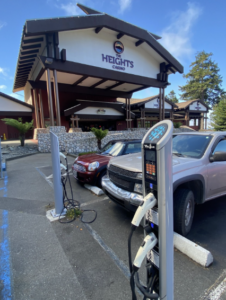 To address the impacts of climate change, Trinidad Rancheria supports the development of adaptation strategies to protect tribal infrastructure, and its natural and cultural resources.
To address the impacts of climate change, Trinidad Rancheria supports the development of adaptation strategies to protect tribal infrastructure, and its natural and cultural resources.
Climate change vulnerability assessment and adaptation planning will help the Trinidad Rancheria prepare for and increase their resilience to climate and extreme weather related events, and is critical to promote long-term community vitality for generations to come.
Staff
Ron Sundberg
Environmental Director
ronsundberg@trinidadrancheria.com
(707) 825-2731
Henry Baker
Environmental Program Technician
hbaker@trinidadrancheria.com
(707) 825-2756
Hours of Operation
Monday-Friday
9:00 a.m.-5:00 p.m.
